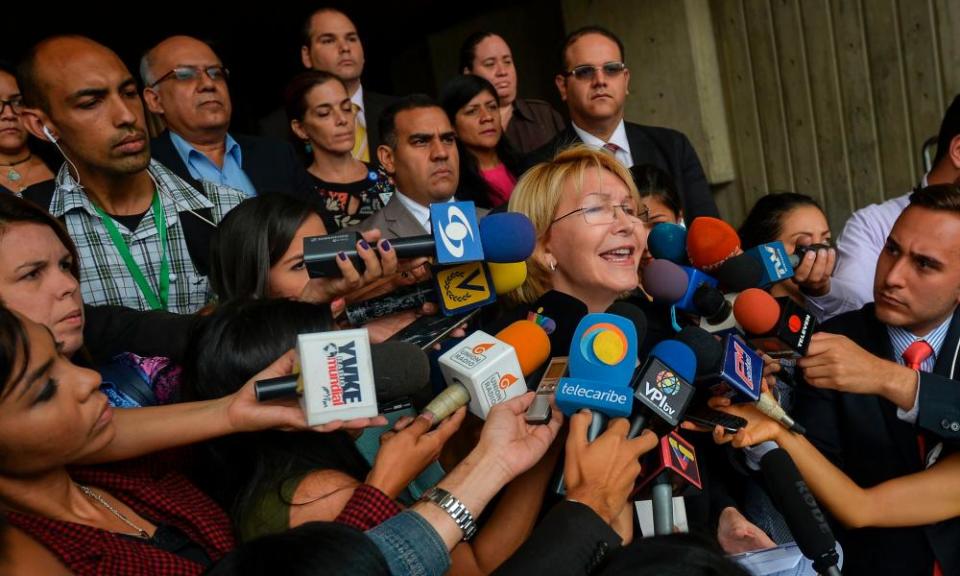Venezuela's chief prosecutor becomes hate figure for Maduro supporters
Luisa Ortega has made a decisive break with the president, and now she’s being decried by the government officials who were once her allies

She has been accused of treachery and described as insane. As Venezuela’s chief prosecutor, Luisa Ortega, has never been the country’s most popular figure, but now the insults are being hurled at her by government officials who – until recently – were her allies.
Ortega has become a hate figure for supporters of Nicolás Maduro following her criticism of the president’s efforts to extend his rule, and his response to a three-month wave of protests in which nearly 70 people have died.
This week, her relationship with the government reached breaking point. On Monday, the 59-year-old lawyer called for the removal of 13 judges she said were elected under irregular circumstances following a surprise opposition victory in the 2015 elections for the national assembly.
The next day, she asked the country’s supreme court to strip away the immunity from prosecution from eight judges who had approved Maduro’s plan to rewrite the country’s constitution.
“They are looking to dismantle the Venezuelan state,” Ortega told reporters on Tuesday. Earlier this month, she said that Maduro’s efforts to shore up his rule were destroying the legacy of Maduro’s predecessor and patron, Hugo Chávez.
Ortega was appointed chief prosecutor in 2007 by the late president and was given a second seven-year term of office in 2014.
Until this year, she had always appeared loyal to Chávez’s “Bolivarian revolution”; her recent political change of heart makes her the highest government official to break ranks with the government since his death in 2013.
The reaction from Maduro’s supporters has been unforgiving: officials have accused her of fomenting violence and even questioned her sanity. One pro-government legislator, Pedro Carreño, called for a medical commission to rule her insane and relieve her of her duties.
Meanwhile, Ortega said that her family had been harassed and followed by intelligence agents.
For Venezuela – currently mired in its worst political crisis since the Chavez rose to power in 1999 – Ortega’s stand marks a symbolic turning point.
But her efforts have so far been checked at nearly every turn: this week, the supreme court rejected her attempts to block Maduro’s constitutional rewrite with an announcement on Twitter. On Wednesday, the same judges Ortega wants replaced ruled that her motion had no ground.
“Ortega has been dealing small, consistent blows that have forced the government to behave in an increasingly illegal fashion. She has denounced the violation of the protesters’ human rights, and she has decried the absurdity of Maduro’s attempt to redraft the constitution. And in defying her rulings, the government has violated all due process”, said Manuel Puyana, editor of Tal Cual, one of the country’s leading liberal papers and a long-time friend of Ortega’s.
According to Puyana, Ortega’s stance is all the more influential because she comes from within chavismo. “She adds to the growing number of dissidents who want a change, but who might not be ready to cozy up to the opposition,” Puyana adds.
For Maduro’s opponents, Ortega’s transformation has been a welcome surprise.
In March, when the supreme court stripped the opposition-controlled assembly of its capacity to legislate Ortega described the move as “a rupture of the constitutional thread,” forcing the court to back-track – and lending fresh legitimacy to the protestors.
A fractious opposition suddenly found itself invigorated and united. For nearly three months, activists have staged non-stop protests.
Unlike in a previous wave of protests in 2014 that left 43 people dead, Ortega has taken a stand throughout.
The spectacled lawyer has delivered consistent and scathing criticism of police abuse and the presence of armed pro-government militias during the demonstrations.
Ortega determined that one protester, 20-year-old Juan Pernalete, had died of a wound to the chest inflicted by a tear gas canister shot at close range by a member of the national guard – and was not murdered by a criminal who infiltrated the demonstration as the foreign minister and the minister of information had both previously reported.
By emerging as an unexpected protector of Chavez’s legacy, Ortega has also underscored the growing rifts between those who supported Chavez but are unhappy at the way his hand-picked successor has driven the country to near-collapse.
Analysts say that – rather than street protests – it is these fissures within chavismo that could represent the biggest threat to the government.
For the government, Ortega’s metamorphosis has little to do with wanting to restore the rule of law, and more with her personal ambitions. “[She] has become a spokesperson for the most reactionary right pretending to emerge as a leader for the supposed transition that the right hopes to force upon us through a coup d’etat,” said vice-president Tareck El Aissami last week.
But Ortega has also come under criticism from some members of the opposition, who say that the current crisis owes much to her previous refusal to take a stand.
Eugenio Hernandez-Breton, head of Venezuela’s universities Legal Caucus, and former president of the Academy of Social Sciences, said Ortega should have heeded the warnings raised by government critics two years ago over the election of the magistrates she now wants to dismiss. “It makes one wonder how much of this crisis could have been prevented if she had done half the things she is doing now,” said Hernandez-Breton. “And it also makes one wonder why she is suddenly doing them now.”

